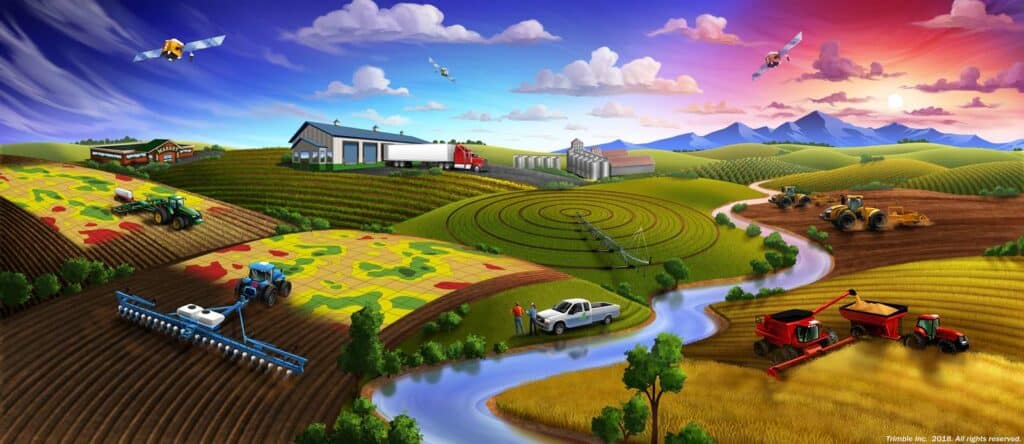Political economy
“The damage done to the economy and the social fabric of society by the Zuma administration through so-called state capture over the past decade is enormous. It will take a mammoth effort by all South Africans respecting the Constitution and the rule of law to turn South Africa around on the road to growth and prosperity for all its people. By instituting the Zondo Commission of Enquiry into State Capture and the Nugent Commission of Enquiry into the South African Revenue Service (SARS), as well as appointing Advocate Shamila Batohi as National Director of Public Prosecutions (NDPP), President Ramaphosa has so far made good on his promise to fight corruption and clean up government and governance,” said Dr John Purchase, CEO of Agbiz in a media release.
Nevertheless, South Africans today still face the real spectre of a failed state situation and far more needs to be done to address nation-building, restore confidence and create an enabling policy and legislative environment to attract investment and foster economic growth and development. The Presidential Jobs Summit and the Investment Summit were steps in the right direction. Political uncertainty, coupled to the 2019 general election, however still holds sway and clarity on critical issues, such as the ANC and EFF’s support for land expropriation without compensation, which in all probability will only become apparent after the election and may very well be determined by the election results.
“Private sector, including the agribusiness sector in particular, can play a major role in this turnaround strategy on condition that real public-private partnerships are established to ensure good planning, execution and counter-accountability. Already the agricultural value chain has taken a leading role in engaging with President Ramaphosa and Minister Nkosazana Dlamini-Zuma in the Presidency, as well as with Ministers Rob Davies and Ebrahim Patel in the economic cluster of Cabinet. The constructive engagements thus far now need to translate into action plans through the 2019 State of the Nation Address (SONA) and the 2019/20 National Budget”, Dr Purchase added.
Agriculture and agribusiness prospects
“We end 2018 on a mixed note as dry and hot weather conditions in many parts across South Africa are currently a source of despondency in South African agriculture. The sentiment in the sector remains subdued as shown in a consistent deterioration in the Agbiz/IDC Agribusiness Confidence Index, which fell to the lowest level in nine years in the fourth quarter of 2018”, said Mr Wandile Sihlobo, Agbiz Head of Agribusiness Research.
Meanwhile, the agricultural GDP rebounded on the third quarter of 2018, growing by 6.5% on a quarter-on-quarter seasonally-adjusted annualised rate. This tells us we are not out of the woods yet. The recent uptick in agricultural GDP is no cause for celebration. The recovery could well be temporary, and weak going forward as the weather outlook, which initially painted a positive outlook, proves to be a key challenge again for summer crop growing areas and could then negatively affect the performance of the agricultural sector in 2019. Having said that, the benefit of the recovery in the Western Cape’s weather conditions could provide a buffer in the sector in the first quarter of 2019. But, the overall annual performance will largely depend on weather conditions in the summer rainfall areas.
The optimistic outlook that we opened the 2018/19 production season with has changed. To recap, the season started on a sound footing with farmers aiming to lift the summer grain and oilseed planting activity by 5% from the previous season to 4.03 million hectares. These plans were followed by real action, as tractor sales amounted to 5 818 units in the first 10 months of this year, up by 9% from the same period last year. At the time, good rainfall in the eastern parts of South Africa enabled farmers to start planting. But the rainfall was erratic and not widespread. As a result, planting activity has proved to be a challenge in most areas, particularly the central and western regions of South Africa. At the same time, the optimal planting period is narrowing for most crops.
On November 30, the South African Weather Service offered an optimistic outlook pointing to a possibility of above-normal rainfall between December 2018 and February 2019. But this remains to be seen as there is still very little evidence of improvement in rainfall on the ground. Moreover, there are fears of an El Niño later in the 2019 summer season. While there are a number of reasons that were cited as a cause for despondency in the sector in the Agbiz/IDC Agribusiness Confidence Index, the weather impact featured prominently. Therefore, it would be right to say that the weather remains a key factor that will determine the growth prospects of the South African agricultural economy in the coming year,” Mr Sihlobo added.
Legislation environment
“Last year we predicted that a raft of legislation emanating from the Green Paper on Land Reform would be finalised this year, namely the Regulation of Agricultural Landholdings Bill, Extension of Security of Tenure Amendment Bill and the Communal Land Tenure Bill. As it turned out, all of the legislation was placed on hold pending the outcome of the deliberations on expropriation without compensation. After conducting provincial hearings, receiving written inputs and allowing parties such as Agbiz to present in Parliament, the Constitutional Review Committee finally resolved that an amendment is required to ‘make explicit that which is implicit in the Constitution’. This seems to indicate that an amendment will be proposed to explicitly allow for expropriation of land without compensation as one of the means to achieve land reform,” Mr Theo Boshoff, Agbiz Head of Leal Intelligence, said today.
After debate in the National Assembly yesterday, Parliament may convene an ad hoc committee or proceed out of its own accord to draft an Amendment Bill indicating the exact wording of an amendment. The circumstances and conditions under which expropriation under no or partial compensation may take place will likely come to the fore in the form of amendments to the Expropriation Bill and not the Constitution itself. Both the Amendment Bill and the Expropriation Bill will require consultation in 2019 and Agbiz will be fully involved in the process and will continue to make constructive inputs, including alternative solutions to achieve sustainable and meaningful land reform. Where irregularities in the process become evident, all options will be considered to ensure that the inputs of stakeholders in the agro-food value chain are meaningfully considered. Unfortunately, this means that the crucial legal steps required to secure tenure in communal areas will likely not be realised in 2019.
“Land reform aside, 2019 will see the implementation of the national minimum wage and amendments to the labour relations framework enter into operation. The legal framework for climate change mitigation and adaptation will come under the microscope in 2019. Aside from the Carbon Tax Bill serving before Parliament, there are numerous sets of draft regulations associated with the Bill that must be considered, as well as the Climate Change Bill that will serve before Nedlac. Finally, Agbiz is excited about the prospects posed by the outcomes of the Presidential Jobs Summit. Numerous agreements were reached to unlock administrative bottlenecks and remove regulations that hamper the development and inclusive growth of the sector. These agreements must be given effect to in 2019, with an emphasis on clear implementation plans with timelines, monitoring and evaluation mechanisms,” Mr Boshoff added.
Grain industry
During the 2017/2018 season, 809 931 tons of white maize was exported. Due to the surplus, white maize was also used for animal feed. Although South Africa has been a net exporter of white maize during the past few years, 1 478 903 tonnes of yellow maize was exported this season. Possible new export markets are China, Malaysia, the Philippines and Middle Eastern countries. New Namibian market regulations which include food safety assessment, transportation and labelling requirements will have a huge implication for South African trade with Namibia. Statutory reporting to the South African Grain Information Service (SAGIS) of intent to import or export is now in place for maize and wheat. This directive may also apply to oilseeds in the future, as both soybean and sunflower are imported.
The SA Cultivar and Technology Agency (SACTA) levy is now applicable to wheat, barley, oats and soybeans. In 2019, Agbiz Grain will continue to play a crucial role in providing SACTA with cultivar information that is used to accurately calculate the levy distribution to seed companies. Early in 2019, SACTA will also launch its transformation plan which comprises a range of skills development options and enterprise development projects for farmer and agricultural business development.
Agbiz Grain has established a firm relationship with Transnet to collaborate on the migration from-road-to-rail and state of readiness. Major issues have to be addressed and reported back on within the next 12 months. During 2019, Agbiz Grain will continue with its series of R2R Task Team meetings between Transnet and various grain industry role players, including traders and processors.
Agbiz Grain continues to play a prominent role in the Forum Steering Committees of all the grains and oilseeds. The grading regulations for wheat will be improved to bring it more in line with international standards and at the same time provide an opportunity to compensate local farmers for producing good quality wheat. Changes will be implemented in the 2019 wheat season after the Department of Agriculture, Forestry and Fisheries (DAFF) has published the new regulations and the Johannesburg Stock Exchange (JSE) has made the necessary changes. Next year, a further relaxation of the release criteria for new wheat cultivars and wheat research priorities will be investigated in order to further stimulate the revival of the local wheat industry which is now firmly on track.
ENQUIRIES:
Dr John Purchase: Agbiz CEO, 082 441 2308, john@agbiz.co.za
Wandile Sihlobo: Head: Economic and Agribusiness Intelligence, 084 572 3485, wandile@agbiz.co.za
Theo Boshoff: Head: Legal Intelligence, 076-951 4269, theo@agbiz.co.za
Mariana Purnell: General Manager at Agbiz Grain, 082 3368 534, marian.purnell@agbizgrain.co.za
The South African Pork Producers’ Organisation (SAPPO) coordinates industry interventions and collaboratively manages risks in the value chain to enable the sustainability and profitability of pork producers in South Africa.







